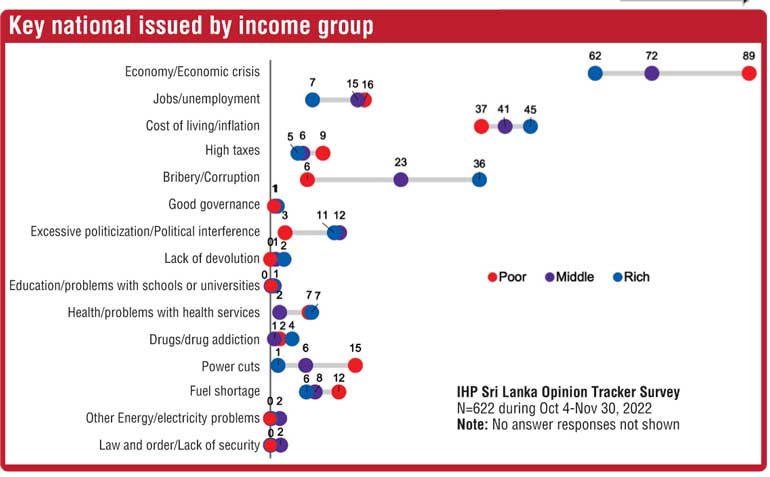Friday Feb 20, 2026
Friday Feb 20, 2026
Saturday, 10 December 2022 00:48 - - {{hitsCtrl.values.hits}}

The public views the economy and economic crisis, followed by inflation as the top two problems facing Sri Lanka – and no other concerns come close.
In polling by the Sri Lanka Opinion Tracker Survey (SLOTS) during October and November 2022, respondents were asked to identify their top national issues currently facing the country.
Seven-in-10 Sri Lankans (73%) view the economy and the economic crisis as one of the top two problems for the country, with the public also rating inflation (41%) and jobs and unemployment (13%) as major economic problems. After economic issues, one-in-four Sri Lankans (23%) view corruption as a priority issue, followed by one-in-10 (9%) who cite politicisation or political interference.
Significant numbers of Sri Lankans also list fuel shortages (8%) and power cuts (7%) as priority problems, followed by 6% who mention high taxes and 5% who mention problems with the health services, according to SLOTS interviews of 622 adults conducted between 4 October – 30 November 2022.
Better-off and poor Sri Lankans differ in their rating of key problems. The poorest one-third of Sri Lankans almost universally (89%) rate the economic crisis as one of the two main national problems, but less than two-thirds (62%) of the richest one-third of Sri Lankans do.
In contrast, better-off Sri Lankans are far more likely to view corruption (36%) and political interference (11%) as leading problems, with few poor Sri Lankans listing corruption (6%) and political interference (3%) as leading problems.
IHP said these differences are paralleled in differences in views between Sinhala and non-Sinhala adults, which also reflects Sinhala adults on average being socioeconomically advantaged than members of other ethnicities.
Non-Sinhala adults are far more likely than Sinhala adults to rate the economic crisis as a leading problem (95% versus 66%). In contrast, the view of corruption (31%) or political interference (12%) as the leading problems is largely a Sinhala concern, with negligible numbers of non-Sinhala adults listing these as the top problems.
IHP is an independent, non-partisan research centre based in Colombo, Sri Lanka. The SLOTS lead investigator is Dr. Ravi Rannan-Eliya of IHP, who has trained in public opinion polling at Harvard University and has conducted numerous surveys over three decades.
SLOTS combines data from daily interviews of a national sample of adults (ages 18 and over), drawn from a large national panel of respondents who were recruited in a field survey during 2019 using stratified random sampling and a separate sample of respondents reached by random digit dialling of mobile numbers. Responses are adjusted to match the national population for sex, age, ethnicity, province, sector, and economic status.
The SLOTS is made possible by funding support from the Neelan Tiruchelvam Trust, The Asia Foundation in Sri Lanka, and others, but the sponsors play no role in the study design, analysis, or interpretation of findings. Interested parties can contact IHP for more detailed data and results.